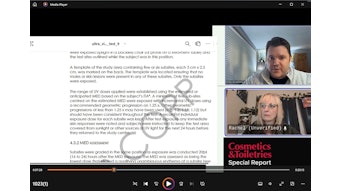On Mar. 13, 2014, U.S. Senator Jack Reed (D-RI) and U.S. Congressman Ed Whitfield (R-KY) introduced the bipartisan, bicameral Sunscreen Innovation Act (S. 2141 and H.R. 4250, respectively), which has been supported by the Public Access to SunScreen (PASS) Coalition. The proposed Act amends the Food, Drug and Cosmetic Act to include a process for the review of sunscreen actives. The Act limits the time that the U.S. Food and Drug Administration (FDA) has to review these ingredients and formalizes the process for its Time and Extent Application (TEA) program. In addition, it requires the FDA to publish decisions on sunscreen sprays and sunscreens with SPF 50+.
This legislation comes on the heels of the FDA's first action as part of the TEA program; its determination that data was insufficient to declare amiloxane and diethylhexyl butamido triazone GRASE. The TEA program was adopted in 2002, at which point the FDA indicated its goal to evaluate TEAs in 90-180 days.
"This legislation is a responsible way to alleviate the current 12 year backlog of sunscreen ingredients, and streamline the review process so the public can gain access to the most effective and innovative sunscreen products," said Wendy Selig, president and CEO of the Melanoma Research Alliance.
The Act suggests that once FDA has determined that an ingredient is eligible, it must submit the ingredient application to its Nonprescription Drugs Advisory Committee (NDAC), which would receive data from the public and communicate with the application's sponsor during the review of the ingredient's safety and efficacy. The Act gives the FDA 11 months for the review of a new ingredient and eight months to make a decision on the pending six sunscreen ingredient TEAs. In addition to the TEA program, the Act also specifies that the FDA would have to publish decisions on the testing and labeling of sunscreen sprays and labeling of sunscreen drug products with SPF 50+.
"This much needed and long overdue legislation is a key step for the approval of critical and innovative ingredients to be used in future sunscreens," said Steven Wang, MD, board-certified dermatologist at Memorial Sloan Kettering Cancer Center. "The FDA has approved several new drugs for the treatment of melanoma in the recent years, and these drugs have made a profound impact on the lives of many patients with advanced disease. Now, it is time for the FDA to focus on prevention of skin cancers and approve the sunscreen ingredients that can better protect the public from harmful ultraviolet rays."
"The creation of a predictable, transparent and timely review process for sunscreen ingredients addresses a growing public concern, and opens the door for further innovation," said Al Pearce, senior marketing manager for personal care at BASF Corp. "The PASS Coalition strongly encourages swift legislative action in both the House and the Senate to see the Sunscreen Innovation Act become law."







!['[Sunscreen] developers will be able to innovate more efficiently while maintaining high standards of quality and safety for consumers.'](https://img.cosmeticsandtoiletries.com/files/base/allured/all/image/2024/06/woman_outside_using_sunscreen_on_face_ISO_test_standards_AdobeStock_783608310.66678a92029d9.png?auto=format%2Ccompress&fit=crop&h=191&q=70&rect=62%2C0%2C2135%2C1200&w=340)


